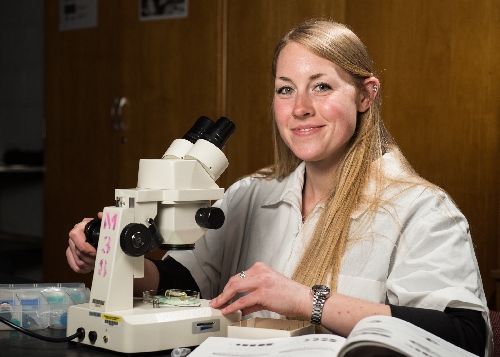University News
Biology/Health Sciences Graduate Student Gains National Attention
April 6, 2015
MACOMB, IL - - Michele Rehbein, a graduate student in the Western Illinois University departments of health sciences and biological sciences, recently presented her thesis work at the 2015 National Environmental Justice Conference in Washington, D.C.
In December, Rehbein submitted her thesis work on West Nile Virus in rural communities and was selected to present her work. She was also named a Youth/Emerging leader in the field of environmental science.
"I am extremely proud of the work we have done and to be given the chance to take part in this conference," Rehbein said.
Rehbein began working in Assistant Professor Catherine Miller-Hunt's virology-immunology lab in June of 2014, which fueled her motivation to pursue a double master's degree in health sciences and biology.
In the lab, Rehbein, Miller-Hunt and another WIU student, Phil Scheibel, a senior biology major from Astoria, IL, created the WIU Vector Biology Program. This program, which works in collaboration with the Illinois Department of Public Health and several local county health departments to monitor and research arthropod vectors of disease, like mosquitoes, flies and ticks, is also making a huge difference in the community.
"Through this program, students can learn valuable experiences and gain opportunities to develop integrated skills within the fields of microbiology, entomology and epidemiology," said Rehbein.
As part of her thesis work, Rehbein has used her skills in the lab to focus on researching West Nile Virus in rural communities.
"Rural areas face many obstacles and challenges when it comes to arboviruses like West Nile Virus. There is less information available on its distribution in rural settings compared to urban areas," Rehbein said.
Catherine Miller-Hunt said Rehbein has been an incredible asset to her lab.
"As a direct result of this Initiative, West Nile Virus surveillance is now possible in rural communities that have never been surveyed before," she said. "Michele's efforts to empower the community through this Initiative have also garnered national attention."
For more information on WIU's biology program, visit www.wiu.edu/biology.
Posted By: Mary Friday (WIUNews@wiu.edu)
Office of University Communications & Marketing



Connect with us: